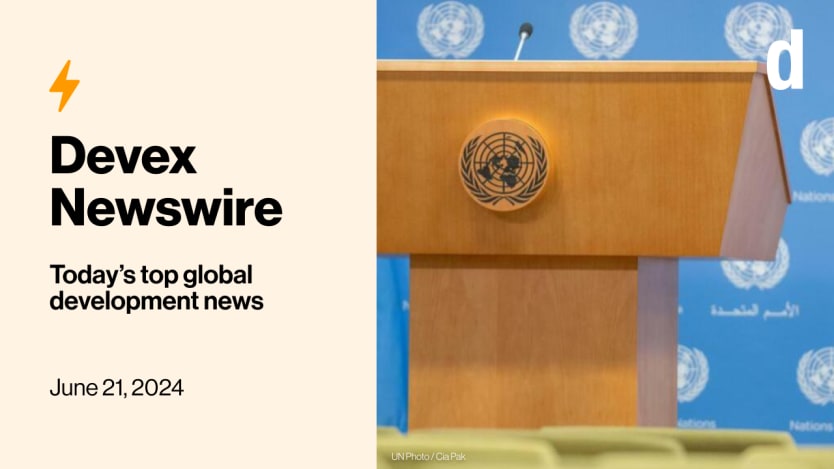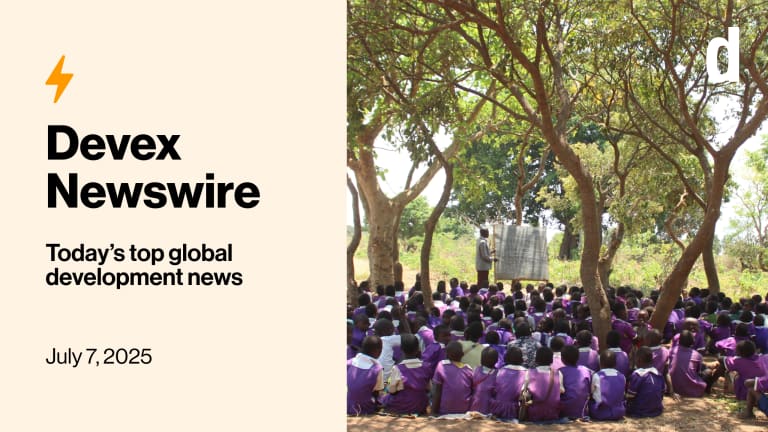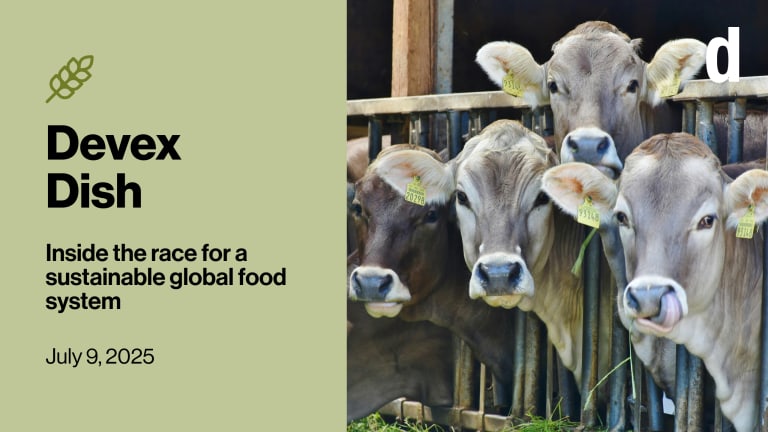
Want to nab a top job at the United Nations? You better have been born in the right place.
Also in today’s edition: Bird flu is back with a vengeance, and Gavi takes strides.
Happening soon: Join us today at 9 a.m. ET (3 p.m. CET) to get honest expert answers to your questions about navigating global development careers. Save your spot now and set your reminder! Can't attend live? Register anyway and we'll send you a recording.
Mine by birthright
The United Nations calls itself “the world's only truly universal global organization” — except it’s not so global when it comes to actually running things. It’s more American, British, French, Chinese, and Russian.
This is a preview of Newswire
Sign up to this newsletter for an inside look at the biggest stories in global development, in your inbox daily.
If that hodgepodge sounds familiar, it’s because those nationalities make up the all-powerful, veto-wielding U.N. Security Council — and as such, they have a lock on some of the most sought-after cabinet-level jobs in the U.N. system, my colleague Colum Lynch reports.
For example, U.S. diplomats have held the top U.N. political job — undersecretary-general for political affairs — since 2007; French officials have run the U.N. peacekeeping department since 1997; while China and Russia have a monopoly on the U.N. secretariat’s top development and counterterrorism jobs, respectively.
Moreover, these five permanent member states received more than 20% of senior appointments — even though they account for only 3% of U.N. membership.
The rest of the hiring system leaves a lot to be desired as well. Many of the remaining jobs, chairs, or commissions are parceled out based on an arcane rotation system, which gives precedent to U.N. regional groups representing Africa, the Asia-Pacific region, Latin America, the Caribbean, Eastern Europe, and the West.
The practice, which has long drawn the ire of reform-minded U.N. advocates, routinely results in embarrassing appointments: A Saudi diplomat, for instance, will chair the Commission on the Status of Women because, well, it was Saudi Arabia’s turn.
“The U.N. needs to do better,” says Ben Donaldson, a co-editor of the Blue Smoke campaign, which advocates for a greater focus on merit for senior U.N. jobs. “There is a vast global talent pool locked out of these top roles. It seems pretty dumb to reduce the concentration of top roles to such a small talent pool.”
Read: The UN's big power job monopoly (Pro)
+ From July 22-26, as part of our Devex Pro Week coverage, we’ll have a packed agenda with events, insider articles, and in-depth reports available exclusively to our Devex Pro members. Take advantage of our limited-time offer of $100 off an annual membership today.
Sign up now to join us for Pro Week and gain access to our Pro content for a full year.
Bird flu strikes again
The H5N1 avian influenza, better known as bird flu, is back with a vengeance. This viral villain has farmers — poultry and cattle — worried as it made an unexpected leap into dairy cows across 12 U.S. states, and has infected 29 people in nine countries since early 2022. While cross-species jumps are rare, they remind us of the potential chaos these viruses can unleash on our agrifood systems.
Despite the spread, U.S. public health officials assure us that the commercial food supply remains safe. Unfortunately, controlling outbreaks often means culling large numbers of birds, which could lead to protein shortages, especially in low-income regions.
“It is an event that sounds an alarm bell,” Thomas Mettenleiter, an expert in animal virus infections at the Friedrich Loeffler Institute, tells Devex contributor Andrew Green. “It’s another in a series of events that tells us that these viruses have to be taken seriously.”
Enter renewed calls for the “One Health” approach — a holistic strategy recognizing the interconnectedness of environmental, animal, and human health. But despite its promise, implementation has been tough due to resource limitations, especially in the veterinary and wildlife sectors. Andrew highlights the struggle to nail down its implementation and address resource inequities.
Read: Bird flu outbreak highlights potential risks for global food security
+ For more content like this, sign up to Devex Dish, a weekly newsletter on the transformation of the global food system.
Gavi’s $9B push
Gavi, the Vaccine Alliance kicked off a major fundraising campaign in Paris yesterday, hoping to secure $9 billion in new pledges. The total funding needed for its ambitious new strategy from 2026 to 2030 is $11.9 billion, but it got a headstart with $2.9 billion in existing pledges, investment income, and leftover COVID-19 resources.
So far, Gavi has raked in $2.4 billion in new pledges, with the U.S. chipping in a hefty $1.58 billion. Gavi CEO Dr. Sania Nishtar is “cautiously optimistic” about donors stepping up, noting that every $1 invested in Gavi translates to $54 in economic returns.
“We are an organization that gives them results. We work in the most difficult parts of the country. We operate at a very lean cost … and we are centered on a model that's built around sustainability,” Nishtar told Devex Senior Reporter Jenny Lei Ravelo, ahead of the launch event.
Nishtar is spearheading sweeping changes. Gavi’s five-year strategy includes a policy revision that aims to better support middle-income countries with a high percentage of zero-dose children and help fragile states in crisis.
A highlight of the campaign is the new $500 million First Response Fund. The rapid-response fund will mainly be used in cases of public health emergencies of international concern that don’t have existing vaccine programs. It’s part of Gavi's broader $2.5 billion Day Zero Financing Facility for Pandemics, designed for quick vaccine deployment during major public health emergencies.
Plus, it’s launching the African Vaccine Manufacturing Accelerator, a $1 billion initiative to boost vaccine production on the continent, ensuring Africa is better prepared for future health challenges.
And in a move that marks the end of an era, Gavi will wrap up its COVID-19 program by the end of 2025. Unspent COVAX funds will be redirected to new initiatives, like the accelerator and the “Big Catch-up” campaign to boost childhood vaccination rates.
Read: Gavi launches $9B replenishment target
Related: High risk, high reward — Gavi's investment in Africa vaccine production
Gavi supports preventive Ebola vax
In a significant move to combat Ebola, Gavi will offer support for preventive vaccines against this deadly disease, Jenny writes.
Though Gavi’s Ebola vaccination effort dates back to 2014 when it committed funding to procure vaccines and it has been instrumental in supporting Ebola outbreak responses, it will now also fund preventive vaccinations. Given Ebola’s high fatality rate of 25% to 90%, this is a crucial development.
The decision follows the World Health Organization’s recommendation to vaccinate health care and front-line workers in countries with a history of Ebola outbreaks. Such workers face high risks due to their critical roles in treating patients and controlling outbreaks.
Gavi’s decision is supported by new data on vaccine effectiveness, protection duration, and supply availability. Gavi also announced support for three other vaccines: a post-exposure human rabies vaccine, a multivalent meningococcal conjugate vaccine for meningitis, and a hepatitis B birth dose vaccine.
Read: Gavi announces support for Ebola vaccines in most at risk countries
+ If you haven’t already, sign up to Devex CheckUp — our free, weekly newsletter that keeps you up to date with all the must-read global health coverage.
In other news
Extreme heat in India has caused over 100 deaths and 40,000 suspected heat stroke cases in the past three-and-a-half months, the country’s Health Ministry reported. [AP News]
The International Monetary Fund has approved over $900 million in funding to support Tanzania in addressing climate change and providing budgetary assistance. [Reuters]
South Africa received its first shipment of mpox antivirals as the number of cases nearly doubled. [Bloomberg]
Sign up to Newswire for an inside look at the biggest stories in global development.








